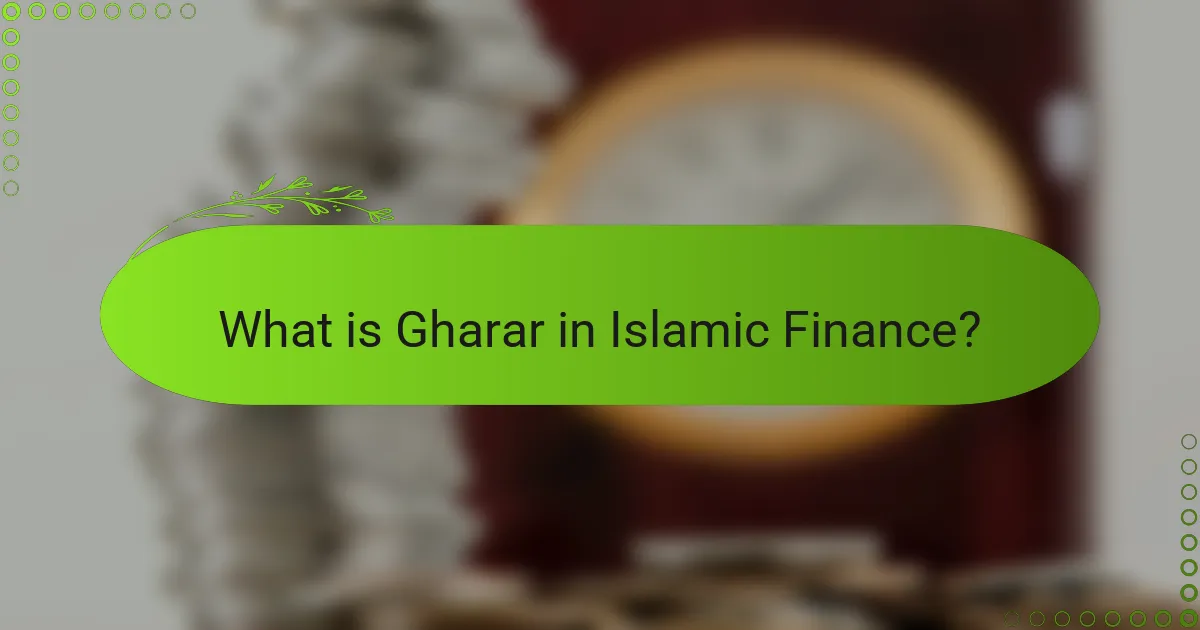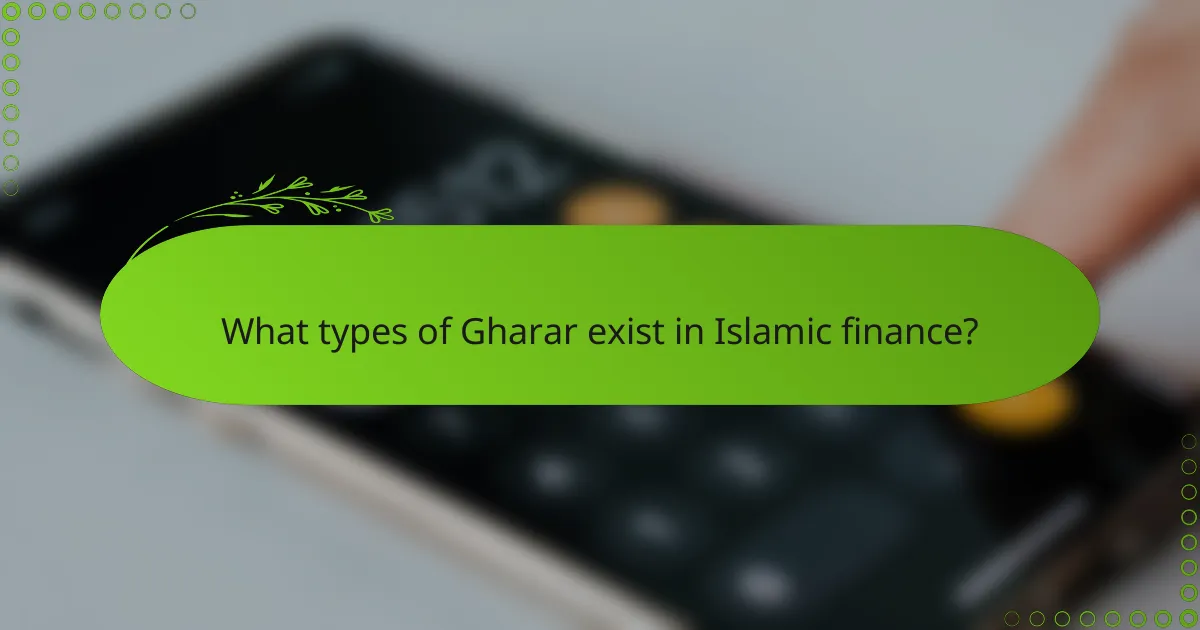
What is Gharar in Islamic Finance?
Gharar in Islamic finance refers to excessive uncertainty or ambiguity in contracts. It is prohibited because it contradicts the principles of fairness and transparency. Transactions involving gharar can lead to unfair exploitation. Islamic finance emphasizes risk-sharing and clear terms. The prohibition of gharar is based on the teachings of the Quran and Hadith. For example, the Quran states that “Allah has permitted trade and forbidden interest” (Quran 2:275). This highlights the importance of clarity in financial dealings. Thus, avoiding gharar is essential for compliant and ethical financial practices in [censured].
How is Gharar defined within Islamic finance principles?
Gharar is defined in Islamic finance as excessive uncertainty or ambiguity in contractual agreements. It prohibits transactions where the outcome is uncertain or speculative. This principle aims to promote transparency and fairness in financial dealings. Islamic scholars argue that Gharar leads to unjust enrichment and exploitation. Contracts must clearly outline terms to avoid Gharar. The prohibition of Gharar is rooted in the Quran and Hadith. For example, the Quran states that trading should be based on mutual consent. This ensures that all parties understand the risks involved in the transaction.
What are the key characteristics of Gharar?
Gharar refers to excessive uncertainty or ambiguity in contracts. It is a key concept in Islamic finance that prohibits transactions with unclear terms. Gharar can lead to unfair exploitation and is considered unethical. Characteristics of Gharar include ambiguity in pricing, unclear delivery terms, and uncertain outcomes. Transactions involving Gharar are deemed invalid under Islamic law. The prohibition aims to promote fairness and transparency in financial dealings. Islamic scholars emphasize the need for clear terms to avoid Gharar. This ensures that all parties understand their rights and obligations.
How does Gharar differ from conventional risk?
Gharar refers to excessive uncertainty or ambiguity in contracts, which is prohibited in Islamic finance. Conventional risk, on the other hand, involves measurable uncertainties that are often accepted in financial transactions. Gharar is characterized by a lack of clarity regarding the subject matter or terms of a contract. This ambiguity can lead to exploitation or unfair advantage, which is against Islamic principles. Conventional risk is typically assessed using statistical methods and can be quantified. In contrast, Gharar is viewed as morally unacceptable, regardless of potential financial outcomes. The prohibition of Gharar aims to promote fairness and transparency in financial dealings.
Why is understanding Gharar important in Islamic finance?
Understanding Gharar is crucial in Islamic finance because it directly relates to the prohibition of excessive uncertainty and ambiguity in contracts. Gharar refers to risk and uncertainty that can lead to unjust enrichment or exploitation. In Islamic finance, transactions must be transparent and based on clear terms to ensure fairness. This principle aligns with Shariah law, which promotes ethical financial practices. The avoidance of Gharar helps maintain trust and stability in financial transactions. Historical Islamic texts emphasize the need for clarity to prevent disputes. Therefore, comprehending Gharar ensures compliance with Islamic principles and fosters a just economic environment.
What role does Gharar play in Islamic financial transactions?
Gharar plays a critical role in Islamic financial transactions by prohibiting excessive uncertainty and ambiguity. Islamic finance principles emphasize transparency and fairness. Transactions involving Gharar are deemed invalid under Sharia law. This prohibition aims to protect parties from potential exploitation. For instance, contracts must clearly define terms and conditions. The avoidance of Gharar fosters trust among participants. Financial instruments like derivatives are often restricted due to Gharar. Therefore, adhering to Gharar guidelines ensures ethical compliance in financial dealings.
How does Gharar influence investor behavior in Islamic finance?
Gharar, which refers to excessive uncertainty or ambiguity in contracts, significantly influences investor behavior in Islamic finance. Investors tend to avoid transactions involving gharar due to Islamic principles prohibiting excessive risk. This avoidance leads to a preference for transparent and well-defined contracts. Investors are encouraged to seek investments that align with ethical standards and minimize uncertainty. The focus on risk-sharing rather than risk transfer shapes investment strategies. Consequently, investors may favor equity-based financing over debt instruments. This behavior promotes a more stable financial environment. Ultimately, gharar encourages investors to engage in transactions that foster trust and fairness.

What types of Gharar exist in Islamic finance?
There are several types of Gharar in Islamic finance. The main types include Gharar al-Muhalabah, which involves excessive uncertainty in a contract. Gharar al-Mudharabah refers to uncertainty in profit-sharing agreements. Gharar al-Muqayadah involves ambiguous terms regarding the subject matter of a contract. Gharar al-Bay’ is related to the sale of goods that are not in possession. Each type reflects different aspects of uncertainty that are prohibited in Islamic finance to ensure fairness and transparency.
What are the different forms of Gharar?
Gharar refers to excessive uncertainty or ambiguity in contracts. There are several forms of Gharar in Islamic finance. One form is Gharar al-Muhalabah, which involves uncertainty in the subject matter of a contract. Another form is Gharar al-Tahqiq, where the outcome of a contract is uncertain. Gharar al-Ma’lum is related to unclear pricing or terms. Lastly, Gharar al-Mahdud involves limitations that create ambiguity in the execution of a contract. Each form of Gharar can lead to disputes and is generally prohibited in Islamic financial transactions.
How do these forms impact financial contracts?
Forms of gharar significantly impact financial contracts by introducing uncertainty and risk. In Islamic finance, contracts must avoid excessive uncertainty to comply with Sharia law. Gharar can lead to invalidation of contracts if it is deemed excessive. This ensures fairness and transparency in transactions. For instance, contracts involving ambiguous terms may be considered void. Financial institutions must clearly define terms to mitigate gharar. This promotes trust between parties involved. Ultimately, reducing gharar fosters a more stable financial environment.
What examples illustrate each type of Gharar?
Gharar refers to excessive uncertainty or ambiguity in contracts within Islamic finance. There are several types of Gharar, each with specific examples.
1. Gharar in Sale Contracts: An example is selling fish that have not yet been caught. The buyer cannot ascertain the quantity or quality of the fish.
2. Gharar in Insurance: Conventional insurance contracts often involve Gharar. The uncertainty of future events makes the risk ambiguous for both parties.
3. Gharar in Options Trading: An example includes trading options without ownership of the underlying asset. The uncertainty surrounding the asset’s future price creates Gharar.
4. Gharar in Futures Contracts: A farmer agreeing to sell crops that are not yet harvested exemplifies Gharar. The uncertainty of yield and market price leads to ambiguity.
These examples illustrate how Gharar manifests in various financial transactions, highlighting the Islamic prohibition of excessive uncertainty.
Why are certain types of Gharar considered more problematic?
Certain types of Gharar are considered more problematic due to the high levels of uncertainty and ambiguity they introduce. This uncertainty can lead to disputes between parties involved in a transaction. In Islamic finance, excessive Gharar is prohibited as it contradicts principles of fairness and transparency. For example, contracts that lack clear terms or conditions create risks that are not acceptable. Additionally, transactions involving speculative elements can result in unjust enrichment for one party. Such scenarios undermine trust and stability in financial dealings. Thus, the problematic nature of specific Gharar types stems from their potential to cause harm and inequity in financial transactions.
What specific risks are associated with these problematic types?
Gharar in Islamic finance introduces specific risks such as uncertainty and ambiguity in contracts. These risks can lead to disputes between parties due to unclear terms. Financial losses may occur if one party does not fulfill their obligations. Additionally, gharar can result in exploitation of weaker parties in a transaction. This exploitation occurs when one party takes advantage of the other’s lack of knowledge. The prohibition of gharar aims to promote fairness and transparency in financial dealings. Without clear terms, the potential for fraud increases in transactions. Islamic finance principles emphasize risk-sharing to mitigate these issues.
How can financial institutions mitigate these risks?
Financial institutions can mitigate risks associated with gharar by implementing clear contractual agreements. These agreements should specify all terms and conditions to eliminate ambiguity. Transparency in transactions is essential to build trust with clients. Institutions can also diversify their investment portfolios to spread risk across various assets. Regular risk assessments can help identify potential issues early. Training staff in Islamic finance principles ensures compliance with ethical standards. Additionally, seeking guidance from scholars in Islamic finance can provide insights on best practices. Implementing these strategies can significantly reduce the uncertainties linked to gharar.

How does Gharar relate to uncertainty and risk management?
Gharar refers to excessive uncertainty and ambiguity in contracts. It is a concept in Islamic finance that prohibits transactions involving unclear terms. Gharar relates to risk management by emphasizing the need for transparency and clarity in financial dealings. This ensures that all parties understand the risks involved. Avoiding Gharar helps mitigate potential disputes and losses. Islamic finance principles advocate for fair and equitable transactions. By eliminating excessive uncertainty, Gharar promotes stable financial environments. This approach aligns with ethical risk management practices in finance.
What is the relationship between Gharar and risk in Islamic finance?
Gharar refers to excessive uncertainty or ambiguity in contracts within Islamic finance. It is prohibited because it introduces risk that can lead to unjust enrichment or exploitation. The relationship between Gharar and risk is significant. Gharar increases the potential for financial loss or unfair advantage. Islamic finance principles emphasize risk-sharing and transparency. Thus, Gharar contradicts these principles by creating unpredictable outcomes. Eliminating Gharar helps mitigate risk in financial transactions. This aligns with the Islamic finance goal of promoting fairness and ethical dealings.
How does Gharar affect the overall risk profile of financial products?
Gharar increases the overall risk profile of financial products by introducing uncertainty. This uncertainty can lead to unpredictable outcomes for investors. Financial products characterized by gharar may lack transparency. Such lack of clarity can result in higher volatility. Investors face potential losses due to unforeseen market movements. The presence of gharar can also deter risk-averse investors. This can limit market participation and liquidity. In Islamic finance, avoiding gharar is essential for ethical compliance. Consequently, financial products with high gharar are often viewed as less favorable.
What are the implications of Gharar on financial stability?
Gharar refers to excessive uncertainty or ambiguity in contracts. Its implications on financial stability include increased risk of market volatility. This volatility can lead to investor distrust and reduced participation in financial markets. Additionally, Gharar can cause misallocation of resources, as funds may be directed towards uncertain ventures. This misallocation can hinder economic growth and stability. Studies indicate that financial systems with high levels of Gharar often experience crises. Therefore, minimizing Gharar is essential for promoting sustainable financial stability.
How can investors navigate Gharar in their financial decisions?
Investors can navigate Gharar by avoiding contracts that involve excessive uncertainty. They should focus on transparent transactions with clear terms. Investors must ensure that all parties understand the risks involved. Utilizing Islamic finance principles can help mitigate Gharar. For instance, engaging in profit-sharing models like Mudarabah reduces uncertainty. Additionally, conducting thorough due diligence is essential. This includes assessing the viability of investments. By adhering to these practices, investors can make informed decisions that align with Islamic finance principles.
What strategies can be employed to minimize exposure to Gharar?
To minimize exposure to Gharar, individuals and businesses can employ several strategies. First, they can engage in thorough due diligence before entering any contracts. This involves researching all aspects of the transaction to understand potential risks. Second, clear contractual terms should be established. This ensures that all parties have a mutual understanding of their rights and obligations. Third, using standardized contracts can reduce ambiguity, thereby lessening uncertainty. Fourth, risk-sharing mechanisms can be implemented, promoting fairness among parties involved. Fifth, seeking advice from knowledgeable scholars in Islamic finance can provide guidance on compliant practices. These strategies help mitigate the risks associated with Gharar, ensuring adherence to Islamic finance principles.
How can understanding Gharar enhance investment outcomes?
Understanding Gharar can enhance investment outcomes by promoting transparency and reducing risk. Gharar refers to excessive uncertainty or ambiguity in contracts. By recognizing and mitigating Gharar, investors can make informed decisions. This leads to clearer agreements and better risk management. Studies show that minimizing uncertainty increases investor confidence. For instance, Islamic finance principles emphasize ethical investments, which often yield stable returns. Thus, understanding Gharar aligns investments with sound ethical practices, improving overall performance.
What best practices should be followed regarding Gharar in Islamic finance?
Best practices regarding Gharar in Islamic finance include ensuring clarity in contracts. Parties should define terms and conditions explicitly. This reduces ambiguity and uncertainty. Additionally, proper risk assessment is essential. Financial transactions should involve fair risk-sharing. Avoiding excessive speculation is crucial. Transactions should be based on tangible assets or services. Transparency in pricing helps prevent misinterpretation. Adherence to Islamic principles promotes ethical financial practices. These practices align with Shariah compliance and foster trust among stakeholders.
Gharar is a central concept in Islamic finance that refers to excessive uncertainty or ambiguity in contracts, which is prohibited due to its potential for unfair exploitation. The article provides a comprehensive overview of gharar, including its definition, key characteristics, and the various forms it takes in financial transactions. It emphasizes the importance of transparency and clarity in contracts to ensure compliance with Islamic principles, highlighting how gharar impacts investor behavior, financial stability, and risk management. Additionally, the article outlines best practices for mitigating gharar to promote ethical financial practices and enhance investment outcomes.